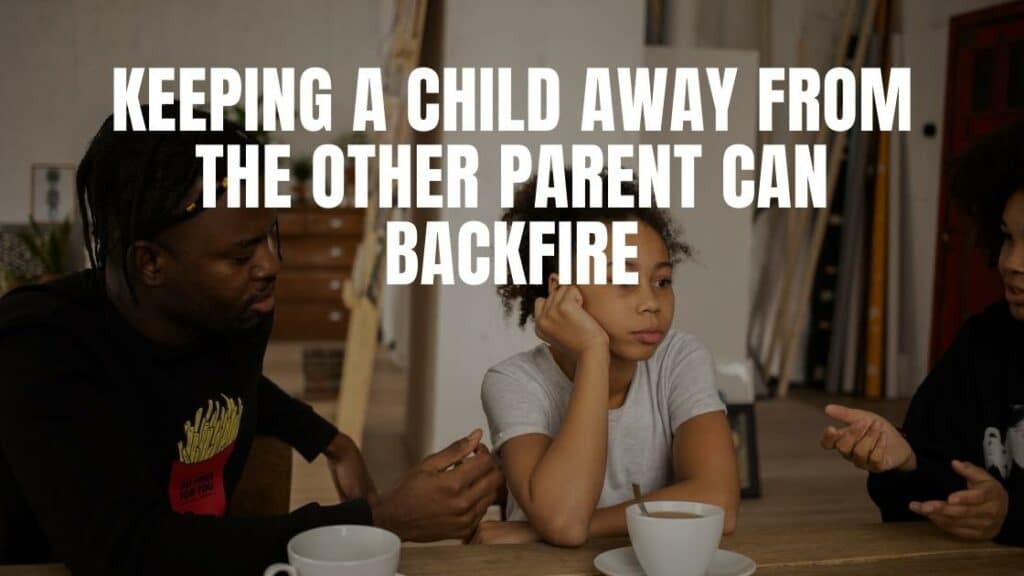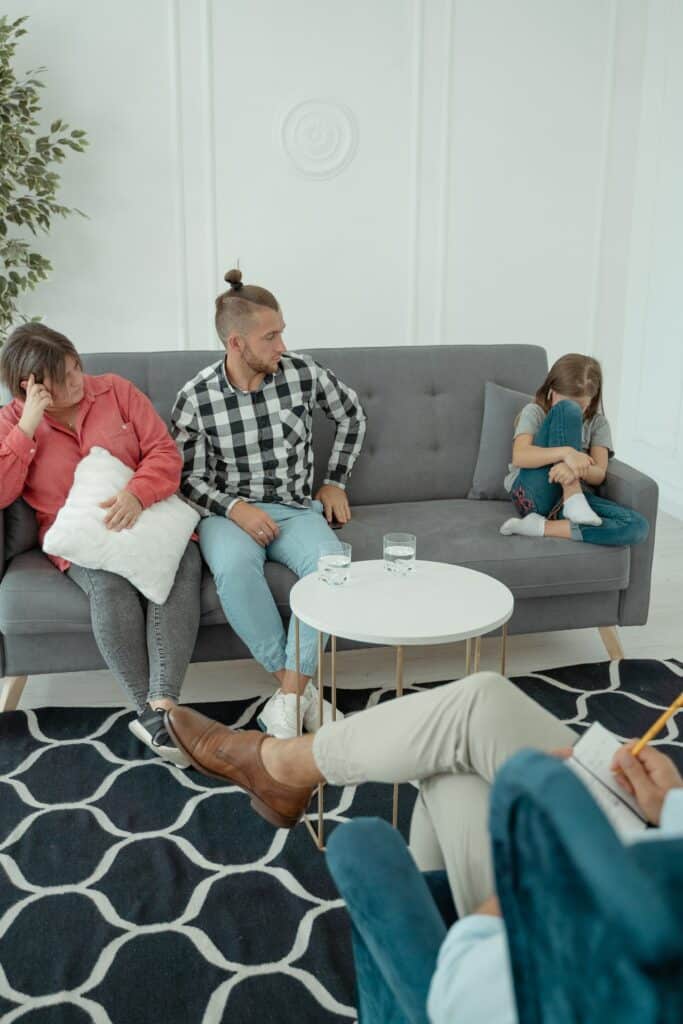It’s no secret that when parents don’t get along, the children are often the ones who suffer. This is especially true when both parents must share custody of the children.
But what happens when one parent tries to keep the children away from the other parent? Surprisingly, this can often backfire and negatively affect the child and the parent.
This article will explore why keeping a child away from the other parent can backfire.
Here’s what you’ll learn:
Let’s get right into it:
The Basics of Child Custody
Child custody is a legal term that describes a parent’s right to have physical and legal control over their child.
There are two types of custody:
- Physical custody
- Legal custody.
Physical custody refers to where the children will live. It’s usually given to one parent, with the other having some visitation rights.
Legal custody refers to the parent’s right to make decisions about the child’s welfare, including education, healthcare, and religious upbringing.
Both physical and legal custody can be either joint or sole.
Joint custody means that both parents have a say in the decisions about the child. Sole custody means that only one parent has a say in those decisions.
Most child custody arrangements are some form of joint custody, with both parents sharing at least some responsibility for the child.
However, there are some situations where one parent gets sole physical custody of the child. These include:
- The other parent is deemed unfit to care for the child. This could be due to drug or alcohol abuse, mental illness, violence, or criminal activity.
- The other parent lives far away, and it would be impractical to have joint custody.
- The child has a strong preference for one parent over the other.
How Are Custody Decisions Made?
In some cases, the parents come to an agreement on custody issues without the need for a court order. However, there are times when the parents cannot agree, or one parent tries to keep the child away from the other.
When this happens, it is often necessary to involve the Court in order to make a decision. The Court will always try to make a decision in the child’s best interests.
There are several factors that the Court will consider when gibving the child custody order. These include:
- The parent child relationship between the child and each parent.
- The ability of each parent to provide for the child’s physical and emotional needs.
- The child’s preferences (if the child is old enough to express a choice).
- The stability of each home environment.
- The ability of each parent to encourage a relationship between the child and the other parent.
- Any history of abuse or neglect by either parent.
When making this decision, the Court also decides how often the other parent will have access to the child.
This is called visitation. The Court may order that the other parent has supervised or unsupervised visitation with the child.
Supervised visitation means that another adult must accompany the other parent when they are around the child. Unsupervised visitation means the other parent can spend time alone with the child.
The Court may also order that the other parent only have contact with the child through phone calls, emails, or text messages.
However, what happens when the custodial parent keeps the children away from the other parent? Keep reading to find out.

How Keeping A Child Away From The Other Parent Can Backfire
Legal Consequences
Visitation is a court order.
Keeping a child away from the other parent violates that court order.
The custodial parent could be held in contempt of Court and face legal consequences, such as a fine or jail time.
The Court is also likely to order a make-up visitation for missed time. This means the custodial parent will have to allow the other parent extra time with the child to compensate for the lost time.
Violating visitation could also result in the court ordering both parents to take reunification classes or participate in counseling. The purpose of these classes or counseling is to help the parents resolve their conflict so that they can have a healthy co-parenting relationship.
Keeping a child away from the other parent could also result in the Court ordering the custodial parent to attend parenting classes. These classes aim to educate the parent on how to co-parent with the other parent effectively and how to put the child’s needs first.
The custodial parent could also be forced to pay for any costs resulting from keeping the child away from the parent. This could include the other parent’s attorney fees, court costs, and travel expenses.
Finally, the Court may decide to change the custody arrangement if it’s determined that the custodial parent is keeping the child away from the other parent.
The custodial parent could lose custody of the child altogether.
Emotional Consequences
Keeping a child away from the other parent can have lasting emotional consequences for the child. When a child is kept from seeing one of their parents, it can cause them to feel isolated, confused, and abandoned.
This is because the child is being deprived of a relationship with one of their parents.
The child may feel caught in the middle of the conflict between the two parents resulting in them blaming themselves for the rift between the parents.
Furthermore, the child may resent the parent who is keeping them away from the other parent. This is especially the case when the custodial parent has painted a negative picture of the other parent, yet the other parent is nothing like how they were described.
The child may rebel against the custodial parent to get back at them for keeping them away from the other parent.
They may also start to act out in school or with their friends. This is because they are feeling a range of emotions they don’t know how to deal with. Such emotions include anger, sadness, and confusion.
Additionally, the child may also develop anxiety and depression. They may also have difficulty trusting people in general if they feel like they can’t trust their parent.
They may become withdrawn and have trouble forming and maintaining relationships. In some cases, the emotional damage caused by keeping a child away from one parent is so severe that it can result in the child developing a mental illness.
Related: When To Leave A Blended Family
What To Do If You Are Being Kept Away From Your Child
If you are the parent being kept away from your child, it is essential to take action.
The first step is to try to resolve the issue with the other parent. This can be done through mediation or counseling.
If you cannot resolve the issue, you should contact an attorney. An attorney can help you file a motion with the Court to enforce visitation.
The Court will hold a hearing where both parents can present their case. After the hearing, the Court will decide whether to change the custody arrangement or order make-up visitation.

Keeping A Child Away From The Other Parent Can Backfire: FAQ
In What Ways Can A Custodial Parent Keep The Child From Seeing the Non-Custodial Parent?
One of the ways that a custodial parent can keep a child from seeing the other parent is through manipulation. The custodial parent may try to convince the child that the other parent is not a good person or that they do not care about them.The custodial parent may turn the child against the other parent by talking badly about them or telling them lies.
This is known as parental alienation.Legally parental alienation is when a parent keeps his or her child away from the other parent.
Parental alienation can cause several problems for the child, including:
- Anxiety and insecurity
- Drug and substance abuse
- Low self-esteem
Another way a custodial parent can keep a child from seeing is through a court order. A judge can deny one parent visitation after consideration of several issues.
Are There Circumstances Where A Custodial Parent Can Deny Visitation?
Yes!
A custodial parent can deny visitation if they can prove that the other parent puts the child in danger. Some examples of danger include:
- Risk of physical harm due to domestic abuse
- Substance abuse
- Mental health issues
- A history of child abuse or neglect
- Hazardous living conditions
- Frequent truancy during visitations
- Exposing children to dangerous situations
If you suspect that any of the above scenarios are happening to your child, you should immediately seek help from the Court where a judge is likely to issue an emergency child custody relief order.
If the other parent is found to be dangerous to the child, the Court modifies the custody agreement on the spot. A judge may order supervised visitation.

Does Refusal To Pay Child Support Warrant Denying Visitation
No, it doesn’t!
Visitation and child support are two separate court orders. One doesn’t affect the other.
A custodial parent can’t legally deny visitation because the other parent isn’t paying child support. If the non-custodial parent falls behind on payments, the custodial parent can take them to Court to enforce the order.
The judge may then order wage garnishment or a bank account seizure to get the non-custodial parent to pay what they owe.
However, refusal to pay child support doesn’t warrant denial of visitation.
Related: Divorce Coach – Facts Checklist
Can A Child Choose Not To Visit The Other Parent
No!
Despite the child’s reasons, their choice doesn’t overshadow a court order. If there is a custody agreement in place, the child must abide by it.
The custodial parent should ensure that the child visits the other parent. The Court deems any refusal by the child as the custodial parent’s fault.
A custodial parent can be held in contempt of Court and may lose custody if the child consistently refuses to visit the other parent.
Can Parental Alienation Backfire
Yes!
If the child is old enough, they may realize what the custodial parent is doing and turn against them. The child may refuse to see the custodial parent altogether. If this happens, the Court may order a change in custody.
What Happens When A Non-Custodial Parent Takes The Child Without The Knowledge of The Custodial Parent?
This is known as parental kidnapping.
Parental kidnapping is a serious offense. The non-custodial parent can be charged with a felony and may face up to five years in prison.
The custodial parent should contact the police immediately if they suspect that the other parent has kidnapped their child.
What Should I Do If I Disagree With How Often My Child Should Visit
If you feel the visitation schedule needs changing, you should file a motion for visitation modification.
In the motion, you will need to state why you feel like the visitation schedule should be changed. You will also need to provide evidence to support your claim.
The Court will then review your case and decide on whether to modify the visitation schedule.
Can Parents Create an Agreement Without a Judge Regarding a Child Custody Court Order?
Yes! Parents can create an agreement outside of Court regarding a child custody court order. This is known as a parenting plan.
A parenting plan is a legally binding document that outlines how the parents will co-parent their child. The plan includes things like:
- Custody arrangement
- Visitation schedule
- Decision-making process for the child
- Communication plan
Parents can create their parenting plan or hire a mediator to help them. Once the plan is created, both parents must sign it.
You should contact an experienced family law attorney if you have any questions about creating a parenting plan.

Don’t Wrongly Lose Custody Or Time With Your Child
Keeping a child from the other parent can backfire in several ways.
It’s essential to follow any court orders that are in place and not try to manipulate the child into siding with you.
If you have any concerns about the other parent, raise them with the Court. Don’t take matters into your own hands as this can result in you losing custody or time with your child.
And if you have any questions regarding custody and how keeping a child away from the other parent can backfire, please ask them in the comment section below.
I’ll be happy to answer any questions asked.
